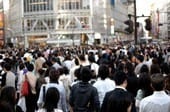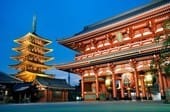tefl/tesol Tokyo
Situated at the far eastern edge of Asia, Japan’s capital is the last major city ahead of the Pacific Ocean. Tokyo is a huge Metropolis which is famous for its international commerce and fast paced lifestyle, however, the city also has many areas of peace and serenity which provide a unique balance and contrast. If you choose this fascinating city as the location for your TEFL/tesol course you are sure to enjoy many experiences that will stay with you for the rest of your life.
Visitors to Tokyo will find the city to be unlike any other in the world, with countless examples of its unique culture to be found everywhere you go. Crime rates are very low and all forms of public transport work on time. Vending machines and 24-hour shops provide a service around the clock, catering to a vast array of requirements. The local people are also extremely welcoming, the food is excellent, the nightlife is lively and the streets are clean, in fact, everything about Tokyo exudes class, what more could you ask for.
It is hard to imagine that you will ever become bored or stuck for something to do in this culturally diverse city. Simple, everyday activities such as catching a train, jumping on the metro or taking a stroll can often turn into a unique and amazing experience.
TEFL/TESOL Tokyo – Cost of Living
Tokyo is regarded by many as one of the world’s most expensive cities. This can be true in some cases; however, a large number of everyday items are still affordable.
You can find meals priced at US$ 4-6 in izakaya bars and noodle houses where large quantities of food is served. You can also find affordable entertainment with a ticket for a traditional sumo wrestling match costing the same as a couple of drinks.
When looking at the whole experience of Tokyo and Japan, the lifestyle, the people, the culture, as well as the employment opportunities once you have completed your course, you can see how attractive the prospect of studying for your TEFL/TESOL certification in Japan really is.
Apply now & get certified to teach english abroad!The School
Located in the Shibuya district, 15 minutes from Shibuya Station, is an English language school which is home to our TEFL/TESOL course in Tokyo.
The course is presented in a modern building with well-equipped classrooms, an extensive resource centre, free internet and all the equipment and materials required for you to successfully complete you course.
There are two computers available within the school for e-mail and planning lessons, as well as a combination of small and large classrooms. The Shibuya district of Tokyo, where our school is based, is a popular area for shopping and entertainment. It is also a short walk away from the Harajuku and Omotesando districts which are also popular. Shibuya is situated near to the Meiji shrine and Yoyogi Park.
You will see many neon signs on the intersection outside the station; these have become an iconic image of Shibuya. This intersection experiences a large number of pedestrians such as shoppers and city workers all needing to use the crossing to get to their destination.
Accommodation
We have several accommodation options available for our TEFL/TESOL course in Tokyo, however, you are free to make your own arrangements if you prefer.
Option 1:
At a cost per night of 4,725 yen for a single, 6,825 yen for a double or 7,875 yen for a twin room, you can experience sleeping on a traditional Japanese futon in a local guesthouse (ryokan). Meals are not included.
Option 2:
If you are on a tighter budget then a hotel maybe the option for you. Prices are as follows and are inclusive of tax.
- 3,350 yen for a single room for one night
- 3,150 yen for a discounted single room (staying more than three consecutive nights)
- 87,900 yen for a single room for a month
- 4,800 yen for a twin room for one night
- 4,600 yen for a discounted twin room (staying more than three consecutive nights)
- 132,000 yen for a twin room for a month
Option 3:
A youth hostel style hotel is a basic option at a low cost. Prices are as follows and are inclusive of tax.
- 2,940 yen per person for an eight-person room
- 8,295 yen daily charge for a two-person room
- 12,600 yen daily charge for a four-person room
- 17,640 yen daily charge for a six-person room
- 23,520 yen daily charge for an eight-person room
Option 4:
A Youth Hostel. Members of the IYHA can stay at the Tokyo Sumidagawa Youth Hostel. To find information on rates please contact the hostel directly.
Course dates
2025
- 1 September 2025 - 26 September
- 6 October 2025 - 31 October
- 3 November 2025 - 28 November
2026
- 5 January 2026 - 30 January
- 2 February 2026 - 27 February
- 2 March 2026 - 27 March
- 6 April 2026 - 1 May
- 11 May 2026 - 5 June
- 8 June 2026 - 3 July
- 6 July 2026 - 31 July
- 7 September 2026 - 2 October
- 5 October 2026 - 30 October
- 2 November 2026 - 27 November
Course fees
The total price is divided into: deposit and balance.
The deposit may be paid via a) credit card b) Paypal c) wire transfer d) Western Union.
The balance of the course fee must be paid by cash, PayPal or bank transfer directly to the training center on the first day of the course.
US$ 400
US$ 1790
Accomodation Fees
The accommodation fees are not part of the course price and you are free to choose whichever accommodation option you prefer.
If you choose to use our accommodation, it should be paid for in cash directly to the school at the start of the course.
JPY 70000







